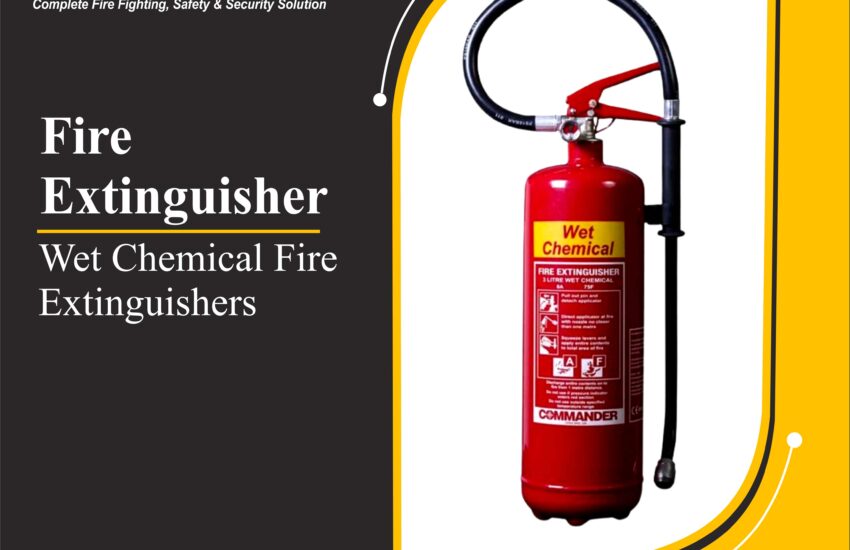Wet Chemical Fire Extinguishers is a specialized firefighting device designed primarily for Class F fires, which involve cooking oils and fats. It works by cooling the flames and forming a soapy layer (saponification) that prevents re-ignition.
These extinguishers are especially important in commercial kitchens, restaurants, hotels, food trucks, cafeterias, and anywhere large-scale cooking is done.
How Does a Wet Chemical Fire Extinguisher Work?
Wet chemical extinguishers contain a solution of potassium acetate, potassium citrate, or potassium carbonate. When discharged onto hot cooking oil or fat, the agent reacts to form a soap-like layer, sealing the surface and cutting off oxygen.
This method:
- Cools the fire to below ignition point
- Prevents splashing and spreading of burning oil
- Reduces the chance of re-ignition
Fire Classes It Can Extinguish
🔥 Class F (or Class K in the US):
- Deep fat fryers
- Cooking oil fires
- Commercial kitchen equipment
🔥 Also suitable for Class A Fires:
- Paper
- Fabric
- Wood
- Plastics
❌ Not suitable for:
- Electrical fires
- Flammable liquids (Class B)
- Flammable gases (Class C)
- Metal fires (Class D)
Where Are Wet Chemical Fire Extinguishers Used?
These extinguishers are ideal for areas with high fire risk from cooking fats and oils:
- Commercial kitchens
- Restaurants and food courts
- Fast food outlets
- School and hospital cafeterias
- Hotel kitchens
- Food trucks
- Catering businesses
- Industrial food processing units
Advantages of Wet Chemical Fire Extinguishers
Specifically designed for kitchen fires
Prevents re-ignition by forming a sealing layer
Reduces risk of hot oil splashes
Safe and easy to use
Also effective on some Class A fires
Available in various sizes (portable and wall-mounted)
Limitations
Not safe for electrical fires
Can leave a residue that requires cleanup
Should only be used by trained personnel
Not suitable for outdoor fires or windy conditions
How to Use a Wet Chemical Fire Extinguisher – PASS Method
- Pull the pin to break the tamper seal
- Aim the nozzle at the fire from a safe distance
- Squeeze the handle to release the chemical
- Sweep in slow, circular motions to cover the fire evenly
Important Note: Always aim above the burning oil to avoid splashing.
Maintenance & Servicing Tips
- Inspect monthly for damage and pressure levels
- Schedule annual professional maintenance
- Ensure wall signs and labels are visible
- Train staff on proper use
- Replace after any discharge, even partial
Standards & Certifications
Make sure the extinguisher complies with relevant standards:
- EN3 certified (Europe)
- UL or NFPA 10 certified (US)
- BIS (India)
- ISO 9001 quality standards
Proper training, certification, and regular servicing are key to effective fire safety.
Conclusion
A wet chemical fire extinguisher is the best solution for tackling dangerous kitchen fires involving hot oil and fat. Its ability to cool and smother flames, along with preventing re-ignition, makes it an essential tool for any professional cooking environment.


